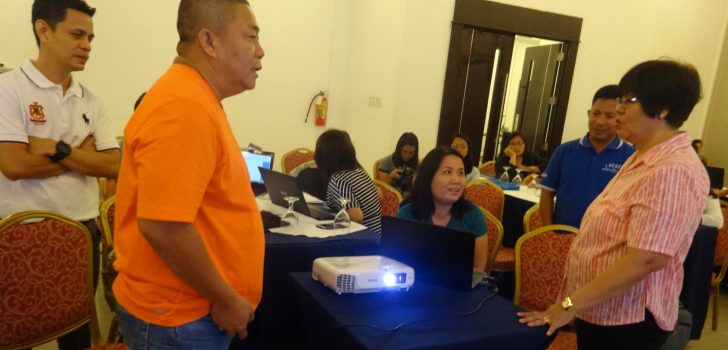 Bicol RPCO Deputy Project Director Adelina Losa (first from right) facilitates the preparation of the PRDP-Bicol’s Work and Financial Plan 2018. (Photo by Annielyn L. Baleza, DA-PRDP RPCO V InfoACE Unit)
Bicol RPCO Deputy Project Director Adelina Losa (first from right) facilitates the preparation of the PRDP-Bicol’s Work and Financial Plan 2018. (Photo by Annielyn L. Baleza, DA-PRDP RPCO V InfoACE Unit) PRDP Bicol shares midyear lessons, identifies ways forward with new M&E tool
PRDP Bicol Deputy Project Director Adelina Losa committed to work closely with the Monitoring and Evaluation (M&E) unit to resolve the challenge of translating subproject approval to actual delivery, implementation and completion.
Losa guaranteed that the PRDP Bicol M&E unit will provide updated and verified data to support the new online feedback mechanism. In addition, she announced that the region’s enterprise development (I-REAP) component now has thematic assignments aside from geographic assignments to cover marketing, operations, organizational development, and finance effective last May 2017.
The Deputy Project Director also cited collective commitment, shared responsibility, and teamwork among components and units as well as streamlining of the PRDP process through constant communication with project partners as strengths of PRDP Bicol. Moving forward, she reiterated the advice of PRDP South Luzon Project Support Office (PSO) Director Shandy Hubilla to appreciate each other’s contributions and pursue excellence instead of perfection.
The PRDP Bicol will also adopt strategic directions from the PSO such as output-driven activities, plan-based budgeting, and establishing accountability teams.
“The midyear review gave us the chance to look back and determine how far have we gone in attaining PRDP objectives and also to see the unending challenges that lie ahead,” Losa remarked.
In an appraisal report presented by National Project Coordination Office M&E Unit Head Jourvin Barrera, the Bicol Region has an efficiency rate of 17 percent in terms of its pace in translating enterprise development (I-REAP) subproject approval into implementation and completion. In terms of I-REAP subprojects, the region has P56.46 million-worth of approved subprojects, P45.98 million-worth of subprojects expected to reach implementation and completion, and P8.04 million-worth of implemented and completed subprojects.
“Though the problem largely rests in the procurement stage, it doesn’t mean that it’s the sole responsibility of the procurement unit. Procurement stage entails the involvement of the procurement unit, the operation, enterprise component, the finance unit, other units such as the Social and Environmental Safeguards in order to hasten or expedite the process of procurement. There must be a cohesive effort between these components and units,” Barrera clarified.
He furthered that the challenge lies on how to strengthen the engagement with the local government units (LGUs) and proponent groups in ensuring that they would cope with the technical and documentary requirements of the Project following the World Bank guidelines and standards which may be new to them.
This challenge if addressed can make LGUs more efficient in providing assistance and ensuring better and sustainable operations.
“As you maintain transparency in M&E, that will really spearhead efficiency because all the concerned players and stakeholders will be aware. These things will be mainstreamed to the regions through PRDP,” Barrera added. ### (Annielyn L. Baleza, DA-PRDP RPCO V InfoACE Unit)
